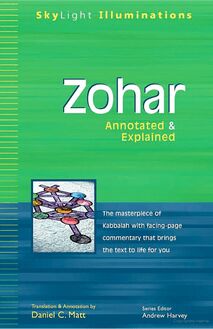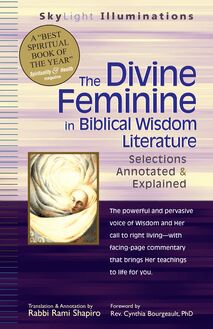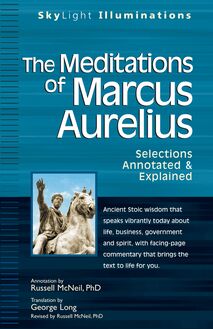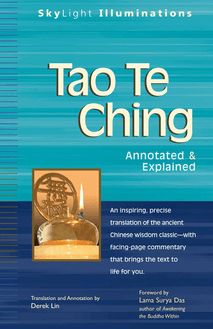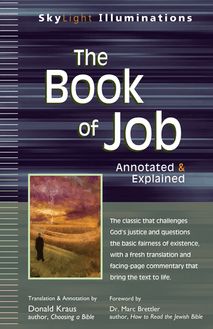The Meditations of Marcus Aurelius , livre ebook
172
pages
English
Ebooks
2011
Vous pourrez modifier la taille du texte de cet ouvrage
Obtenez un accès à la bibliothèque pour le consulter en ligne En savoir plus
Découvre YouScribe en t'inscrivant gratuitement
Découvre YouScribe en t'inscrivant gratuitement
172
pages
English
Ebooks
2011
Vous pourrez modifier la taille du texte de cet ouvrage
Obtenez un accès à la bibliothèque pour le consulter en ligne En savoir plus
Publié par
Date de parution
09 juin 2011
Nombre de lectures
5
EAN13
9781594733475
Langue
English
The timeless wisdom of an ancient Stoic can become a companion
for your own spiritual journey.
Stoicism is often portrayed as a cheerless, stiff-upper-lip philosophy of suffering and doom. Yet as experienced through the thoughtful and penetrating writings of Roman emperor Marcus Aurelius (121–180 CE), the Stoic approach to life is surprisingly rich, nuanced, clear-eyed and friendly.
With facing-page commentary that explains the texts for you, Russell McNeil, PhD, guides you through key passages from Aurelius’s Meditations, comprised of the emperor’s collected personal journal entries, to uncover the startlingly modern relevance his words have today. From devotion to family and duty to country, to a near-prophetic view of the natural world that aligns with modern physics, Aurelius’s words speak as potently today as they did two millennia ago.
Now you can discover the tenderness, intelligence and honesty of Aurelius’s writings with no previous background in philosophy or the classics. This SkyLight Illuminations edition offers insightful and engaging commentary that explains the historical background of Stoicism, as well as the ways this ancient philosophical system can offer psychological and spiritual insight into your contemporary life. You will be encouraged to explore and challenge Aurelius’s ideas of what makes a fulfilling life—and in so doing you may discover new ways of perceiving happiness.
Publié par
Date de parution
09 juin 2011
Nombre de lectures
5
EAN13
9781594733475
Langue
English
Books in theSkyLight Illuminations Series
The Art of War-Spirituality for Conflict: Annotated & Explained Bhagavad Gita: Annotated & Explained The Book of Mormon: Selections Annotated & Explained Dhammapada: Annotated & Explained The Divine Feminine in Biblical Wisdom Literature: Selections Annotated & Explained The End of Days: Essential Selections from Apocalyptic Texts-Annotated & Explained Ethics of the Sages: Pirke Avot-Annotated & Explained Gnostic Writings on the Soul: Annotated & Explained The Gospel of Philip: Annotated & Explained The Gospel of Thomas: Annotated & Explained Hasidic Tales: Annotated & Explained The Hebrew Prophets: Selections Annotated & Explained The Hidden Gospel of Matthew: Annotated & Explained The Infancy Gospels of Jesus: Apocryphal Tales from the Childhoods of Mary and Jesus-Annotated & Explained The Lost Sayings of Jesus: Teachings from Ancient Christian, Jewish, Gnostic and Islamic Sources-Annotated & Explained The Meditations of Marcus Aurelius: Selections Annotated & Explained Native American Stories of the Sacred: Annotated & Explained Philokalia: The Eastern Christian Spiritual Texts-Annotated & Explained The Qur’an and Sayings of Prophet Muhammad: Selections Annotated & Explained Rumi and Islam: Selections from His Stories, Poems, and Discourses-Annotated & Explained The Sacred Writings of Paul: Selections Annotated & Explained The Secret Book of John: The Gnostic Gospel-Annotated & Explained Selections from the Gospel of Sri Ramakrishna: Annotated & Explained Sex Texts from the Bible: Selections Annotated & Explained Spiritual Writings on Mary: Annotated & Explained Tao Te Ching: Annotated & Explained The Way of a Pilgrim: The Jesus Prayer Journey-Annotated & Explained Zohar: Annotated & Explained
The Meditations of Marcus Aurelius: Selections Annotated & Explained
2009 Quality Paperback Edition, Second Printing 2007 Quality Paperback Edition, First Printing Annotations and introductory material © 2007 by Russell McNeil
All rights reserved. No part of this book may be reproduced or transmitted in any form or by any means, electronic or mechanical, including photocopying, recording, or by any information storage and retrieval system, without permission in writing from the publisher.
For information regarding permission to reprint material from this book, please mail or fax your request in writing to SkyLight Paths Publishing, Permissions Department, at the address / fax number listed below, or e-mail your request to permissions@skylightpaths.com.
All biblical quotations used in this work are from the New Revised Standard Version (NRSV) of the Bible.
Library of Congress Cataloging-in-Publication Data Marcus Aurelius, Emperor of Rome, 121-180. [Meditations. English. Selections] The meditations of Marcus Aurelius : selections annotated & explained / annotation by Russell McNeil ; translation by George Long ; revised by Russell McNeil. p. cm. - (SkyLight illuminations) Includes bibliographical references. ISBN-13: 978-1-59473-236-2 (quality pbk.) ISBN-10: 1-59473-236-1 (quality pbk.) 1. Ethics. 2. Stoics. 3. Life. I. McNeil, Russell. II. Long, George, 1800-1879. III. Title. B581.M36 2007 188-dc22 2007028506
10 9 8 7 6 5 4 3 2
Manufactured in the United States of America Cover design: Walter C. Bumford III, Stockton, Massachusetts Cover art: Equestrian statue of Marcus Aurelius
SkyLight Paths Publishing is creating a place where people of different spiritual traditions come together for challenge and inspiration, a place where we can help each other understand the mystery that lies at the heart of our existence.
SkyLight Paths sees both believers and seekers as a community that increasingly transcends traditional boundaries of religion and denomination-people wanting to learn from each other, walking together, finding the way .
SkyLight Paths, “Walking Together, Finding the Way” and colophon are trademarks of LongHill Partners, Inc., registered in the U.S. Patent and Trademark Office.
Walking Together, Finding the Way ® Published by SkyLight Paths Publishing A Division of LongHill Partners, Inc. Sunset Farm Offices, Route 4, P.O. Box 237 Woodstock, VT 05091 Tel: (802) 457-4000 Fax: (802) 457-4004 www.skylightpaths.com
Contents
Acknowledgments
Introduction
1 The Promise of Stoicism
The Power of Opinion
Fame and Fortune as False Values
The Promise of Happiness
A Contract with Nature
Time, Motion, Cosmology, and Evolution
Fate and Destiny
2 Stoicism and Virtue
The Importance of Love and the Meaning of Justice
Misfortune and Opportunity
Morality and the Role of Virtue
Virtuous Role Models
3 Stoicism and Vice
The Nature of Evil and Insignificance of Misfortune
Never Seek Praise and Never Blame Others
Stoic Psychology, Alienation, and Free Will
The Problem with Anger and Discontent
Stoicism and Mental Health
Ignoring What Others Think
Moral Relativism
4 Stoicism and the Body
Mind over Matter
The Stoic Attitude toward Pleasure
Rising above Pain
Aging and Death
5 Stoicism and the Mind
The Supremacy of Reason
Supreme Beauty
False Opinion
6 The Method of Stoicism
Living according to Nature
Accepting Our Fate
Inquiry and the Practice of Philosophy
The Life of Virtue
7 Stoicism and the Environment
The Seeds of Logos
The Sacredness of Nature
Cosmic Gaia and the Unity of Nature
Imitating Nature in Our Technologies
Nature and Climate Change
8 The Practice of Stoicism
Meditation, Prayer, and the Wrestler’s Art
Implications for Work and Business
A Ten-Step Program in Anger Management
On Sexuality and Addiction
On Anxiety and Depression
On Flattery and Pride
On Knowing Yourself and “Wolfish” Friendships
On Misfortune, Death, and Martyrdom
9 Society and Government in Stoicism
Government and Political Duty
Society and Social Collapse
War and Terrorism
Political Activism, Criticism, and Dissent
Glossary
Notes
Suggestions for Further Reading
About SkyLight Paths
Copyright
Acknowledgments
To my grandmother Mamie Addicott, who taught me to laugh and to love music. To my grandfather William Russell McNeil, who labored with dignity for fifty years underground in the coal mines of Cape Breton, and who taught me to love geometry. To my colleagues and friends at Vancouver Island University; the University of Nevada, Las Vegas; and the University of Victoria: Ian Johnston for inspiration; John Black for trust and friendship; Maureen Okun for poetry and precision; Norm Cameron for skepticism and eclecticism; Janina Hornosty for insight and integrity; Lisa MacLean for creativity; Maggie McColl for valuing science; Gwyneth Evans for sensitivity; Libby McGrattan for taking care of us all; Kayley Vernalis (now at Cal State U, LA) for philosophy and art; Len Zane (UNLV) for physics; Bill Weller for astronomy; and David S. Scott (U Vic) for vision. To my children, Liam, Bronwyn, and Rose Siubhan, who taught me to love life. To Madeleine Ware, who supported me throughout all of this. To Mark Ogilbee, my SkyLight Paths editor, who believed I could do this. And to Marcus Aurelius, who labored to make us all free so long ago. Here are his words:
Always observe how ephemeral and worthless human things are, and what was yesterday a little mucous tomorrow will be a mummy or ashes. Pass then through this little space of time conformably to nature, and end your journey in contentment, just as an olive falls off when it is ripe, blessing nature who produced it, and thanking the tree on which it grew.
-IV:48
Introduction
The Meditations of Roman emperor Marcus Aurelius Antoninus (121-180 CE) is not a religious work or a sacred text or even a philosophical treatise on Stoicism. The original material consisted of roughly four hundred relatively short personal notes written over ten years and scattered in twelve journals composed in no particular order-much of it repetitive. In spite of this, the Meditations is widely read today by people from all walks of life and used by many in the regulation of their personal lives, in businesses, and even in the conduct of government. For many people, the Meditations is life changing. The intensely personal quality of the writing mirrors the soul of a deeply compassionate man who expressed his ideas with penetrating tenderness, intelligence, and honesty.
This book will show you how to reason like a Stoic. Although Stoicism is no longer considered a living philosophy, it has as much significance today as it did two thousand years ago. The strength of Stoicism resides in its reverence for that unique human capacity called reason . Most of the personal, political, and environmental troubles we face at the dawn of this century come not from the exercise of human reason but from its abuse-in the guise of power and passion. Stoicism offers psychological and spiritual remedies in all three areas by showing us how we can address our contemporary troubles.
Stoicism is not a religion. It is an ancient philosophical system with profound spiritual consequences. The word stoic, when used today, has come to refer to those people who appear indifferent to or unaffected by the emotional experiences of pleasure or pain. This indeed was a characteristic in those who held Stoicism as a philosophy. But this mental attitude is also characteristic of Buddhism, which like Stoicism, also advocates the restriction of desires and the control of suffering. For a true Stoic (and a true Buddhist), these mental attitudes are genuine and a means to their respective philosophical goals. For a Buddhist, the eventual goal is enlightenment. For the Stoic the goal is a different sort of enlightenment, better expressed as happiness or joy in this life . Although the popular image of Stoicism is one of stiff indifference, the Stoicism of the ancient world was a surprisingly friendly and compassionate system with remarkable relevance in our times.
“The Most Beautiful Figure in Histor

